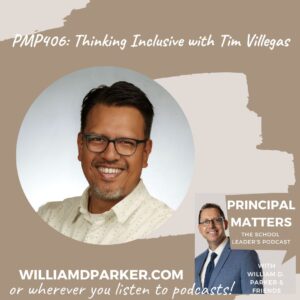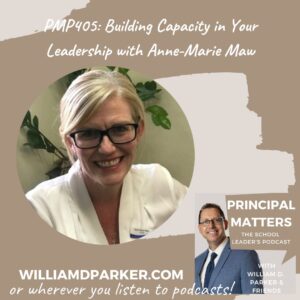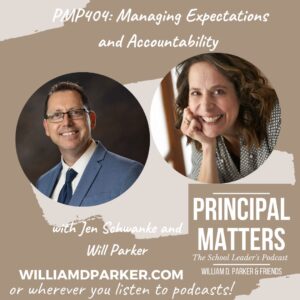Podcast: Play in new window | Download
Daniel (DJ) Klein is an Assistant Principal at Ocean Springs High School, in Ocean Springs, Mississippi. For longtime Principal Matters listeners, you may recognize the name DJ Klein from two previous episodes:
First, on June 4, 2020, DJ joined me when for PMP197 when we recorded an episode discussing ideas to keep in mind as he was moving into his first administrative role as Assistant Principal.
Then on July 14, 2021, DJ and I recorded PMP253 where he shared lessons from his first year as a school administrator.
This week DJ Klein is back to share lessons from his 2nd year in school administration. He was also kind enough to provide detailed notes and summaries to accompany this podcast episode. I will share them below:
“My Second Year in Administration – Reflections, Lessons Learned, and Takeaways to Implement Into My Own Journey to a Future Principalship” from DJ Klein:
1. Develop Two to Three Personal Yearly Goals and Work Streams
This lesson echoes the points of forming goals in your previous conversation with Daniel Bauer in episode 297. At the beginning of each year, reflect on areas in your leadership in which you would like to grow. Form work streams with others that can help you achieve these personal goals. Inspect your progression monthly or at the end of the first semester.
2. Evaluate Each Situation in its Entirety
They say there are three sides to a story: mine, yours, and the truth. During my previous role, a large amount of my day was dedicated to navigating a 6A (the largest school classification at the time) athletic program through the COVID-19 pandemic. Obviously, problems did arise while I wore that hat, however the challenges that I was confronted with during this school year differed in many ways. Educational leaders have many different challenges we see every day and, due to the nature of the work that we do, it is very easy to allow the false urgency we experience to influence a decision that we are about to make. Do not get me wrong, there are some cases – especially regarding student safety – where a quick decision has to be made at the moment. However, for everything else, it is critical that we get all of the information – the full story and all of the facts-before we can reach a thorough understanding of the matter at hand and make the best decision for whoever may be involved.
3. Form a Relationship with A Mentor Principal and be Deliberate in Serving as a Mentor Yourself
When I was a first year teacher and football coach, I had an amazing mentor teacher named Shannon McKay who went above and beyond to see that I was successful in teaching a state tested subject. That first year came with many hard-learned lessons, however it was only through her dedication to set up a fail-proof support system for me that I was able to turn into the successful teacher I became. She had over 27 years of experience (I was only 23!) to pass down to me, and I was all ears. In administration, we sometimes are tasked with assigning mentor teachers to either first year teachers or teachers who are new to our school. The irony is that many administrators do not have their own mentor (a veteran principal who does not work in the same building) to go to when they are seeking guidance on a difficult topic. Whether you are 30 or 50 years old, if you are getting into administration for the first time, be intentional about seeking out that mentor principal who can serve in that capacity. On the flip side, be intentional about serving as a mentor yourself. It may be in serving a teacher who aspires to go into administration, a teacher who wants to grow into a leadership role in the school, or even a student who expresses to you that they want to be a teacher after college. As assistant principals who will one day go into a lead role, we can continue to build up the next great assistant principal and teacher leaders. The process never truly stops, but we must be intentional on it.
4. Form School-Level Committees to Include a Variety Of Stakeholders that All Have a Common Goal: Ensuring Our Students Get The Most Out of Their Educational Experience
I have to give my head principal, Braxton Stowe, a shout out for this idea that I will implement during my first year as a lead principal one day. No matter the grade levels in your building, as leaders we all want to ensure that our school is meeting the diverse needs of all of our students. At Ocean Springs High School, we have many committees that meet monthly or quarterly with the lead principal and members of the administrative team. For example, we have a Student Advisory Council, Parent Advisory Council, a Guiding Coalition Council (made up of parents, students, teachers, and administrators), and a Teacher Advisory Council. Through the feedback from all of these stakeholders, we have made many positive changes in our school that, at the end of the day, benefit all of our students. As the quote goes, “it takes a village to raise a child.” It is best include everyone you can in the process!
5. Commit To Reflective Practices Weekly
As human beings, we generally learn through two primary methods: through our own experience, or through somebody else’s experience. Throughout this school year (and the previous), I utilize the Notes App on my Iphone to write down events, interactions, decisions, and other materials for my own reflection. Although many of us strictly focus on the negative experiences to reflect upon (in the hopes of not repeating said experience), it is equally important to reflect on the positive experiences as well. Although no two days are the same in this role, there will be deja-vu moments that we can draw back on these experiences and confidently move forward in the present time knowing that we are going in the right direction.
6. Maintain a “Later List” as You Progress Throughout the Year
Kudos to the book, The Together Leader: Get Organized for Your Success – and Sanity! by Maia Heyck-Merlin – https://www.thetogethergroup.com/books/the-together-leader
A great book and website that offers a wide variety of organizational tools, strategies, templates, and ideas to help stay on top of your daily, weekly, monthly, and yearly responsibilities. Maia Heyck-Merlin offers excellent professional development workshops for both principal teams and teachers.
7. Embrace Your Role as a Lead Learner
Oklahoma Pastor Craig Groechel hosts a great leadership podcast and states constantly that “when the leader gets better, everyone gets better.” Promoting a positive culture of growth, goal setting, accountability, and rewards between teachers and students is an everyday mission for school leaders. However, we must also see ourselves as lead leaders who work collaboratively with our teachers in our daily walk to help our students reach their full potential. In Viviane Robinson’s book Student Centered Leadership (2011), she identifies 5 domains that hold significant effect on student achievement:
- Establishing goals and expectations
- Resourcing strategically
- Ensuring quality teaching
- Leading teacher learning and development
- Ensuring an orderly and safe environment
The most significant of these domains, as determined by Robinson, is leading teacher learning (being proactively involved with teachers). The principal who only covers areas such as establishing a vision, acquiring resources for teachers, working to help individual teachers, and other similar activities does not necessarily learn what is specifically needed to stimulate ongoing organizational improvement. The principal has to also make teacher learning and make their own learning a priority. For the domain of teacher learning and development, Robinson found two critical factors:
1) The ability of the principal to make progress a collective endeavor and 2) Skills for leading professional learning. Both of these factors require the principal to be present as a learner.
8. Know How to Leverage Data and be Familiar With How it Impacts Your School’s State Accountability Rating
One of the learning curves that I had this year was learning how the high school accountability system works. Although it may vary from state to state, I would be intentional about learning each parameter that goes into your school’s rating and familiarize yourself with the data that is behind it. When going over this data, you can discover patterns and areas for growth to not only improve your school holistically, but also for individual students as well.
9.Be Visible Outside of School (especially if you are a Middle School and High School administrator)
As administrators, we wear several hats. In Mississippi and other states, athletic events and most after school events require a member of the school’s administrative team to be present to ensure the event runs smoothly and safely. With a school of almost 1900 students and growing (the incoming freshman and sophomore classes are both 500 strong) in a small coastal town of roughly 18,000 people, it is safe to say that there is always something going on. During our weekly admin meetings, we make an effort to go to other events involving our students to show them that we are there to support them. Throughout the year, we have an amazing theater department that puts on several great shows that I have brought my own family to. To see the theater students showcase their talents and run into them in the hallway or while on morning duty and talk about their performance is truly rewarding. In addition, our arts department conducts an open gallery twice a year at a local restaurant for the public to observe. We also have an arts signing day, JROTC signing day, athletic signing day, and various celebrations throughout the year. It does take time, but when you plug in to our student’s lives outside of the everyday bell to bell schedule, you form relationships that you normally would not and see just how gifted and special your students really are.
10. The Second Key: Being a District and System Player
In Michel Fullan’s book The Principal: Three Keys to Maximizing Impact, the author emphasizes that educational leaders can see great potential for schools to grow when they pair up with other-like schools (whether it be a feeder in order to compare practices. Partnering with other principals, visiting other school sites, and coordinating professional development opportunities such as vertical alignment meetings with teachers can reap great benefits in the long run. On top of the book study that I mentioned earlier, we also have a variety of committees made up of administrators from all of our schools and central office. I have the pleasure of serving on our policy committee with our Director of HR, Communications Director, a school testing coordinator, five assistant principals and lead principal from various grade levels that meet monthly. I have learned a great deal about the process of implementing new policies along with revising current ones and how it impacts our district on a macro and micro level. In addition, I had the opportunity this year to shadow two amazing assistant principals, Adelle Register and Nikeland Cooper, at our Upper Elementary and Middle School and discover how their departments operate. Through these experiences, I came away with several ideas, take-aways, and a better understanding of what our students experience before they get to the high school level.
Let’s Wrap It Up
In summary, keep these ten lessons in mind in your school leadership:
- Develop Two to Three Personal Yearly Goals and Work Streams
- Evaluate Each Situation in its Entirety
- Form a Relationship with A Mentor Principal and be Deliberate in Serving as a Mentor Yourself
- Form School-Level Committees to Include a Variety Of Stakeholders that All Have a Common Goal: Ensuring Our Students Get The Most Out of Their Educational Experience
- Commit To Reflective Practices Weekly:
- Maintain a “Later List” as You Progress Throughout the Year
- Embrace Your Role as a Lead Learner
- Know How to Leverage Data and be Familiar With How it Impacts Your School’s State Accountability Rating
- Be Visible Outside of School (especially Middle School and High School administrators)
- The Second Key: Being a District and System Player
Stay Connected
A big thank you DJ Klein for sharing these lessons. Want to stay in touch with DJ Klein? You can reach him by email DKlein412@gmail.com or via Instgram @DKlein412.


